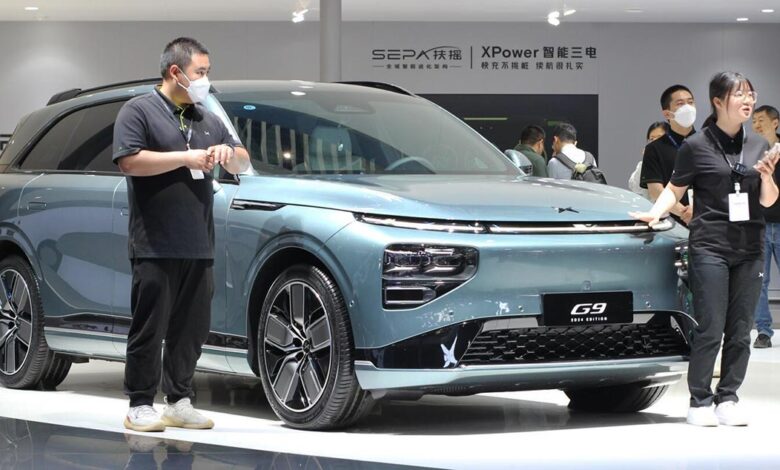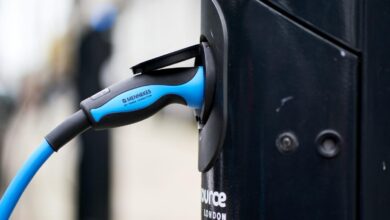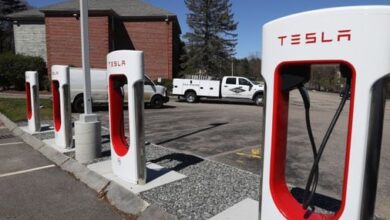Xpeng sees more collaboration with other carmakers as long-term trend

Xpeng will offer its autonomous driving and EV technology to other automakers, allowing the company to generate a new stream of revenue, its vice president Brian Gu said in an interview with the South China Morning Post.
Xpeng (NYSE: XPEV) sees more collaboration with other carmakers as a long-term trend, as the Chinese electric vehicle (EV) maker is building joint models with German auto giant Volkswagen.
Xpeng will offer its autonomous driving and EV technology to other automakers, allowing the company to generate a new stream of revenue, Brian Gu, the company’s vice president, said in a May 17 interview with the South China Morning Post.
The company gave the G6 SUV (sport utility vehicle) and X9 MPV (multi-purpose vehicle) their official debuts in Hong Kong on May 17, with the first right-hand-drive versions of the G6 expected to be delivered in the third quarter.
“We see more collaborations as the long-term trend, because it’s hard to imagine traditional car manufacturers developing smart driving technologies quickly by relying on their own capabilities,” Gu said, according to the South China Morning Post.
Smart driving technology is the future of EVs, and recent partnerships with other automakers have enabled Xpeng to license its technology and generate huge economic returns, he said.
” I think if you own the leading technologies, there are many ways to monetize them,” Gu said.
Automotive giants such as Volkswagen and General Motors, once dominant in China, are now struggling to keep pace with mainland Chinese EV makers due to slow electrification progress, the report noted.
On July 26, 2023, Volkswagen announced that it would invest about $700 million to acquire about 4.99 percent of Xpeng, and the two companies plan to co-develop two Volkswagen-branded EV models for China’s mid-size vehicle market.
Xpeng and Volkswagen will build the two models using their respective core competencies, the Xpeng G9 platform, and connectivity and ADAS (Advanced Driver Assistance System) software, according to a statement last July.
On April 17, Xpeng announced that it had signed a framework agreement with Volkswagen for technical cooperation in Electrical/Electronic architecture (E/E architecture).
The two parties will jointly develop and integrate Xpeng’s latest generation of E/E architecture into Volkswagen’s China Main Platform (CMP), according to the statement last month.
Fast-reacting Chinese startups are seen as having a technological edge in electrification. In addition to Xpeng, more local companies are partnering with foreign automakers.
On October 26, 2023, Leapmotor said Stellantis would invest 1.5 billion euros ($1.6 billion) in it for a roughly 20 percent stake, making the European automotive giant the largest outside shareholder in it.
On May 14, Leapmotor’s joint venture with Stellantis, Leapmotor International, was officially launched and will begin selling vehicles in Europe from September.
Stellantis leads the Amsterdam, Netherlands-based joint venture with a 51 percent stake and Leapmotor holds the other 49 percent.
On February 26, Nio (NYSE: NIO) announced that its subsidiary, Nio Technology (Anhui) Co Ltd, had entered into a technology licensing agreement with Forseven Limited, a subsidiary of Abu Dhabi government fund CYVN Holdings.
Nio would grant Forseven a non-exclusive and non-transferable worldwide license to use certain of the company’s existing and future technical information, technical solutions, software and intellectual property related to the company’s smart EV platform, according to its announcement.
Forseven is a UK-based electric vehicle startup company bankrolled by CYVN.
($1 = €0.9273)
Nio signs technology license agreement with CYVN subsidiary Forseven



![Kia EV4 spotted for the first time revealing new low-cost EV [Video] Kia EV4 spotted for the first time revealing new low-cost EV [Video]](https://europeantech.news/wp-content/uploads/2024/06/1717697480_Kia-EV4-spotted-5-390x220.jpeg)